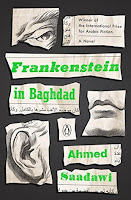The Top Ten Most Recent Additions to My Library
These are the latest books I've acquired for reading over the next couple of months.
The Committed: A Novel by Viet Thanh Nguyen. I read Nguyen's award-winning The Sympathizer five years ago and look forward to reading this follow-up with my local book group. Set in Paris it looks to be an exciting international thriller with a patina of ideas.
Walt Whitman's MEMORANDA DURING THE WAR: Written on the spot in 1863-'65. I'm already halfway through this beautiful and touching memoir of Whitman's time spent nursing soldiers during the civil war. There are moments when he waxes poetic and tells stories about soldiers that will break your heart.
Drum-Taps: The Complete 1865 Edition by Walt Whitman. More from Whitman with some of his most famous poems including "When Lilacs last in the door-yard bloom'd" and "O Captain! My Captain!".
The Annals of Tacitus. Translated , with an introduction and notes , by A. J. Woodman. This is the latest monthly read for my Online Great Books group. Filled with the details of Augustus and his immediate successors through Nero (with some years missing because the complete text has not survived). Lots of interesting machinations and bloody endings for both good and bad alike.
Ambrose Bierce's Civil War, edited and with an introduction by William McCann. Both Bierce's memoirs of the war and his short stories set in the Civil War are included in this edition of his works. I look forward to reading this along with the Whitman.
Ambrose Bierce: alone in bad company. This is the biography of Bierce by Roy Morris, Jr. who has also written about Mark Twain's time in the west and Walt Whitman's experiences during the civil war. I expect this will be as good as those works.
Interior Chinatown by Charles Yu. This won the National Book Award for Fiction in 2020 beating out Shuggie Bain among others for the prize. It is the hysterical and satirical story of Willie Wu who is described as a "generic Asian man".
Selected Poems of Herman Melville. Yes, the author of Moby-Dick was also a great poet. In particular he wrote about the Civil War in addition to the Sea and other topics. This is part of my reading for a University of Chicago Basic Program course called "The Unwritable War: Civil War Tales and Poems".
Duino Elegies and The Sonnets to Orpheus of Rainer Maria Rilke. This is the current read for my local study group. I am looking forward to diving deep into these famous poems by the author of one of my favorite novels, The Notebooks of Malte Laurids Brigge.
Frankenstein in Baghdad by Ahmed Saadawi. This prize-winning book was a finalist for the Man Booker International Prize in 2018. From the rubble-strewn streets of U.S.-occupied Baghdad, Hadi--a scavenger and an oddball fixture at a local café--collects human body parts and stitches them together to create a corpse. Sounds like the makings for a fantastic journey.







